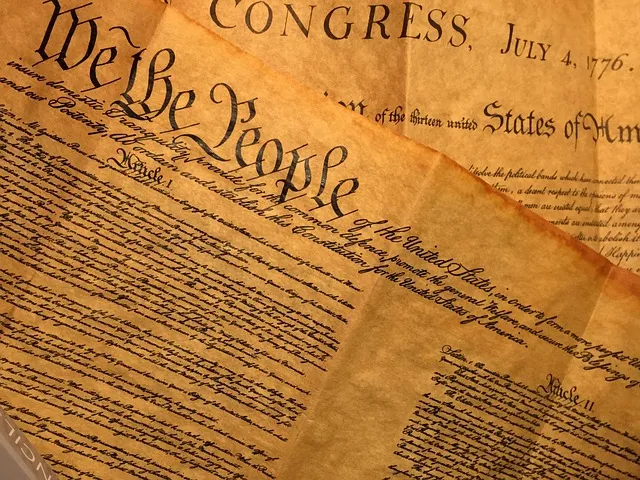“Invasions on the rights of the people.”
That phrase isn’t hyperbole; it’s straight out of the Declaration of Independence.
Say “invasion,” and people picture foreign armies crossing a border. To the Founders, a far more dangerous invasion came from within. They used that same word for what happens when government violates your liberty and seizes power it was never given.
To them, that wasn’t a mere policy debate. It was the most dangerous “invasion” we face.
FORGED IN MISTRUST
In 1776, Virginia’s new Constitution and Declaration of Rights didn’t just establish independence; it listed British offenses. The most powerful charge was that the king had launched “invasions” against liberty itself.
“by dissolving legislative assemblies repeatedly and continually, for opposing with manly firmness his invasions of the rights of the people”
This charge was so essential that it was repeated in the Declaration of Independence.
“He has dissolved Representative Houses repeatedly, for opposing with manly firmness his invasions on the rights of the people.”
St. George Tucker explained that the American Revolution gave birth to written constitutions designed to counteract government’s tendency to exercise arbitrary power and invade the rights of the people.
“The American revolution seems to have given birth to this new political phenomenon: in every state a written constitution was framed, and adopted by the people, both in their individual and sovereign capacity, and character.”
How does a constitution do that? By spelling out what government is authorized to do in the first place.
“by this means, also, government was reduced to its elements; its object was defined, its principles ascertained; its powers limited, and fixed; its structure organized; and the functions of every part of the machine so clearly designated, as to prevent any interference, so long as the limits of each were observed.”
Even though words on paper don’t stop government power, a written constitution still acts like an air raid siren: alerting the people when their own government is invading their rights and powers.
“A written constitution has moreover the peculiar advantage of serving as a beacon to apprise the people when their rights and liberties are invaded, or in danger.”
INVASION IS TREASON
This language showed up everywhere. On the Federalist side, Noah Webster called it what it was: treason.
“If any man attempts to use force and compel his countrymen to receive his system, in preference to others, it is an unwarrantable act – a high misdemeanor – an invasion of liberty – perhaps it may be treason: tho it would be difficult to punish it in a course of legal justice, for there is no law by which it can be determined.”
Alexander Hamilton, a man who wanted to abolish the states, admitted they were the essential firewall against federal invasions.
“It may safely be received as an axiom in our political system, that the State governments will, in all possible contingencies, afford complete security against invasions of the public liberty by the national authority.”
And on the Anti-Federalist side, Richard Henry Lee took a similar position: states must guard against every invasion of their reserved powers by the federal government.
“I take this reasoning to be unrefutable, a{nd} therefore it becomes the friends of liberty to guard {with} perfect vigilance every right that belongs to the Sta{tes} and to protest against every invasion of them”
WAR ON YOU
The Founders didn’t invent the idea of government as an invader, they inherited it from people like Algernon Sidney.
Nearly a century before the Revolution, Sidney was blunt: the ultimate crime is the invasion of a people’s right to self-government.
“Is not the invasion of it the most outrageous injury that can be done to all mankind, and most particularly to the nation that is enslaved by it?”
John Locke’s principle was clear: when government violates rights or exercises arbitrary power, it is waging war on the people themselves.
“Whenever the legislators endeavour to take away, and destroy the property of the people, or to reduce them to slavery under arbitrary power, they put themselves into a state of war with the people, who are thereupon absolved from any farther obedience”
Benjamin Franklin confirmed this same brutal truth during the Philadelphia convention in 1787. Government is in a never-ending war with the people.
“As all history informs us, there has been in every State & Kingdom a constant kind of warfare between the Governing & Governed: the one striving to obtain more for its support, and the other to pay less”
HOW TO RESPOND
When government becomes the invader, the founders knew the response must match the threat. Even when speaking out meant risking everything, James Otis, Jr. said forget playing it safe.
“When our rights are invaded, it is high time to throw aside prudence”
Even Alexander Hamilton understood that constitutional violations aren’t mere policy disagreements – they’re usurpations of power that deserve a very specific response.
“But it will not follow from this doctrine that acts of the large society which are NOT PURSUANT to its constitutional powers, but which are invasions of the residuary authorities of the smaller societies, will become the supreme law of the land. These will be merely acts of usurpation, and will deserve to be treated as such”
Samuel Adams made the ultimate point: nothing is worse than a government invasion of your rights, and there is no higher duty than to defend them against any and all attackers.
“The people hold the Invasion of their Rights & Liberties the most horrid rebellion and a Neglect to defend them against any Power whatsoever the highest Treason.”
Read the full article here


